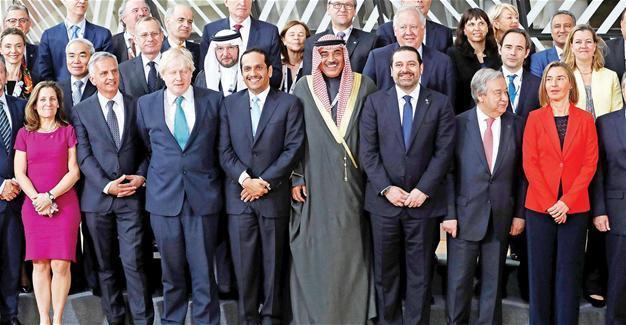Russia alone in backing Syria
MOSCOW
 Russia stood by its ally Damascus on April 5 ahead of a United Nations Security Council meeting to address accusations the Syrian government launched a chemical weapons attack that killed scores of civilians.
Russia stood by its ally Damascus on April 5 ahead of a United Nations Security Council meeting to address accusations the Syrian government launched a chemical weapons attack that killed scores of civilians.At least 72 people, among them 20 children, were killed in an April 4 attack in rebel-held Khan Sheikhoun, and dozens more were left gasping for air, convulsing and foaming at the mouth, doctors said.
Western countries, including the United States, blamed Syrian President Bashar al-Assad’s armed forces for the chemical attack, while the World Health Organization said there was reason to suspect a chemical attack, with some victims displaying symptoms suggesting exposure to “a category of chemicals that includes nerve agents.”
Britain, France and the U.S. circulated a draft Security Council resolution demanding a swift investigation, after pointing the finger at al-Assad’s government for the attack.
Washington said it believed the deaths were caused by sarin nerve gas dropped by Syrian aircraft.
But Moscow, which launched a military intervention in 2015 in support of al-Assad’s forces, said the deaths were caused when a Syrian air strike hit a “terrorist warehouse” used for making bombs containing “toxic substances.”
Kremlin spokesman Dmitry Peskov said Russia would argue its case blaming the rebels at the United Nations.
“Russia and its armed forces will continue their operations to support the anti-terrorist operations of Syria’s armed forces to free the country,” Peskov told reporters.
Syria’s army has denied any use of chemical weapons, saying it “has never used them, anytime, anywhere, and will not do so in the future.”
But its denials have done little to quiet international condemnation, with U.N. chief Antonio Guterres on April 5 saying the “horrific events” showed that “war crimes are going on in Syria.”
Pope Francis said he was “horrified” by the “unacceptable massacre... where dozens of defenseless people, including many children, were killed.”
Others blamed Damascus more directly for the attack, including British Foreign Secretary Boris Johnson, who said “all the evidence I have seen suggests this was the al-Assad regime.”
EU president Donald Tusk said al-Assad’s government bore “primary responsibility for the atrocities,” adding “all those who support the regime share the moral and political responsibility.”
Washington also accused al-Assad’s government of responsibility, but drew criticism from Syria’s opposition, which said an apparent softening of the U.S. line on the embattled leader had emboldened him.
Iran, another key al-Assad ally, condemned “all use of chemical weapons” in Syria, but suggested the blame for the attack may lie with “terrorist groups.”
Video uploaded to social media showed civilians sprawled on the ground, some in convulsions, others lifeless. Rescue workers hosed down the limp bodies of small children, trying to wash away chemicals. People also wailed and pounded on the chests of victims.
If confirmed, the attack would be among the worst incidents of chemical weapons use in Syria’s brutal civil war, which has killed over 320,000 people since it began in March 2011.
Hasan Haj Ali, a commander of the Free Idlib Army rebel group, called the Russian statement blaming the rebels a “lie” and said rebels did not have the capability to produce nerve gas.
“Everyone saw the plane while it was bombing with gas,” he told Reuters from northwestern Syria. “Likewise, all the civilians in the area know that there are no military positions there, or places for the manufacture [of weapons].”
















